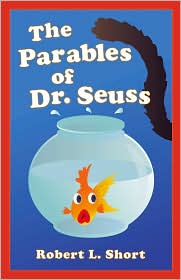
I am a huge fan of Dr. Seuss... The sad thing is that my boys are now at the age where they are putting such chidlish things behind them... So I'll have to wait another 20 years or so until I unearth them again...
I have used a couple of them in various ways within talks and church events in the past, and have previously blogged a version for 2 voices, but I have never attempted to discern an overarching "Seussian Theology". However, Robert Short, tired of mining the Peanuts cartoons for theological nuggets, has, and has just published "The Parables of Dr. Seuss" which seems to read FAR too much into them (just as he did in his former books). When will people learn that good parables (e.g. those told by a certain carpernter from Nazareth) are generally metaphorical, NOT direct analogies, and are to be inhabited and appropriated by the reader!? Sorry, just got side-tracked into a litero-philosophical rant...
The reason I was posting was to direct fellow Seuss fans of a theological bent to a brilliant poetic tribute to Seuss and Karl Barth, inspired by a review of Short's book and a book of Barth's prayers on Ben Myers' Faith and Theology blog. Check it out... its worth a minute or two of your time...
Comments